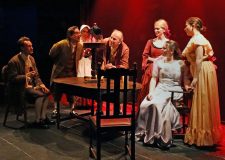BREMF – I, Spie – The Telling
Soprano Clare Norburn has once again gathered The Telling, her troupe of fine musicians and actors, to illustrate an episode of 16th century drama with music of the time and words in modern idiom. This year the focus is on John Dowland, portrayed with ingenuous charm by Dominic Marsh. As a master lutenist he was allowed international travel and entrée into important European courts but he never gained enough credit back home for his supreme skill. He couldn’t win a position in the court of Queen Elizabeth, who apparently did not trust him because he was Catholic, or perhaps she just didn’t like him. Dowland it seems had difficulty getting on with people. The master of melancholy, he had a bitter side, spoiled by disappointment.
This, however, has not lessened the appeal of his music down the ages. ‘Fine knacks for ladies’ is a light, flirty ditty, in manner miles away from the doleful Dowland of the melancholy ‘Lachrimæ’, based on his song ‘Flow, my tears’. The music in this drama-concert is all of the highest quality, with Emily Baines (recorder), Giles Lewin (fiddle), Alison Kinder (viol) and Jamie Akers (lute) also participating as a singing chorus and tavern crowd. Dowland’s life-threatening predicament in prison as a spy and his social fumblings as a rather selfish lover cause a dramatic tension that is relieved by the musical interludes. My favourite moment was the instrumental rendering of ‘In darkness let me dwell’ with the tune most tellingly voiced by Giles Lewin’s fiddle. I could almost hear the words!
The drama’s complex narrative is clearly expressed by the mercurial Danny Webb who delivers gleeful menace as the jailor, the torturer, various recusant spies and as Sir Robert Cecil the spy-master. Also wearing many different hats is Alice Imelda as The Woman, a sensuous personification of the various Marias who inspired or thwarted Dowland’s narcissistic ambitions. These two antagonists prance around the hapless lutenist giving life to this particularly shady moment in his long and eventful career.
This is perhaps the moment to mention Natalie Rowland’s subtle lighting design, generally unobtrusive but highlighting the climaxes, which greatly enhanced the visual effect. However, without raked seating the sight-lines were poor because Nicholas Renton’s direction has Dowland sitting much of the time on a low stool or the stage floor, and even lying down.
Clare Norburn’s text often breaks the fourth wall, directly challenging the audience to side with Dowland or his tormentors. Most of us didn’t break the spy code or decide if Dowland was a traitor or true, but history relates that he was set free to eventually publish his songs. Unbound, Marsh finally sings too, the bittersweet ‘Now, O now I needs must part’, and then leads the players off the stage.
20th October, 2021
Rating: 




Andrew Connal




















